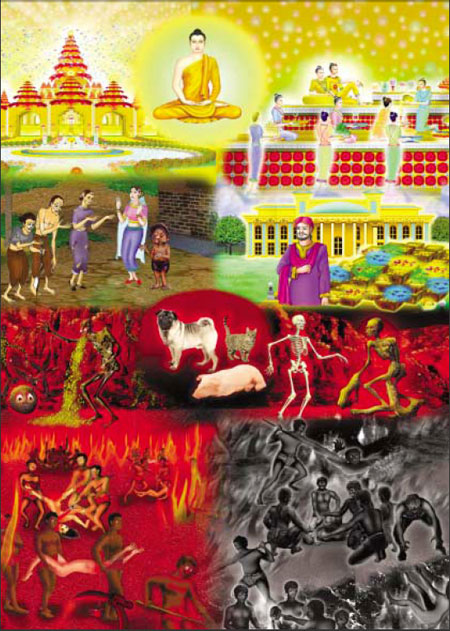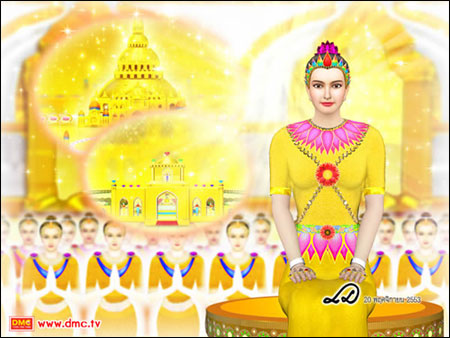Dad, Why Were We Born?
All good deeds and bad deeds have consequences.
One day, a family invited guests to their home for a religions rite for the great-grandparent. After the ceremony, when all the guests had left, the son asked the father,
“Dad, since everyone has to die like our grandparent, then what is the purpose of life ?,
The father, who had acquired knowledge about Buddhism, replied to his beloved son,
“My son, deep down inside, everybody, rich or poor, a commoner or a king, has asked what we are doing here, what the true purpose of life is. And even I used to wonder about that.
This question has prompted me to study Buddhism seriously, which has given me an understanding of life:
1. Death is not the end. We still have to be reborn indefinitely, as long as we have not rid ourselves of our defilements.
2. All good deeds and bad deeds have consequences. They can bear fruit in thid life or in the next. We can see that some people are born smart, some are not. Some are good looking, and some are not. All these factors are the products of their kamma.
3. Hell and heaven do exist. Hell is punishment for those who have committed sinful deeds, and heaven is the home to those who have performed virtuous deeds.
Hell is punishment for those who have committed sinful deeds
“And if we look closely at the births of all living creatures, we will see that they are different. Some are born from the womb, other species are born from the egg, and still others are born from filthy water. But there are species which we have not laid eyes on, but we have heard about them: celestial beings and infernal degenerates. They are born fully grown and parent-less, an autonomous and spontaneous birth.
“The knowledge of these three subject matters I acquired from Buddhism. They have influenced me to improve myself, to elevate my morals, and to accumulate merit. I am hoping that in my future life, when my merits are perfected, with all my defilements crushed (exhausted). I will follow the Lord Buddha into Nibbana.
“After my studies, the first thing that came to my mind was how to steer myself, my parents, your mother and all my children away from misdeeds, And furthermore, I wanted to ensure that all of our grandparents would go to heaven. Once I had set this goal, I took a good look at myself. While I still had to ake a living, to provide of your mother and all of you, as well as your grandparents, I sought a way for my family to gain merits at the same time. So I learned more about Buddhism and learned that there was a set of Dhamma specifically for laypersons. There are four virtues, and they are called dhamma for Laypersons (Gharavas-dhamma).
1. Truthfulness (Sacca)
“This first virtue taught me to be sincers, strainght-forward, and honest. Remember, son, most people would resort to lying to get off the hook. You must not do that. You should be answerable to your responsibilities, to your profession, punctual with your commitments, and honest to everyone. And most of all you must abide by ethics, such as the Five Precepts. They you will not be the subject of mistrust. You will walk proudly with respect all your life, and this is what I have acquired.
heaven is the home to those who have performed virtuous deeds.
2. Self-improvement (Dama)
“The second virtue is to always improve oneself. I Kept improving myself professionally. From an ignorant person, I kept advancing myself until I was able to be a good provider, own my own business, become proficient in my career, and keep abreast of people around my and world events, I was able to control myself not to succumb to vices, to refrain from imbibing, smoking, lying and cheating on your mother. These are the values which I have acquired that lead to wisdom.
3. Physical and mental endurance (Khanti)
“Enduring physical and mental hardships is the third virtue. No matter what the root causes are, I was able to endure physical hardships, weariness, pain, and mistreatment. On top of this, I was able to resist temptations. A monk once said that whoever is able to resist temptations. A monk once said that whoever is able to endure these hardships would be strong, charismatic, and successful, And this is how I have acquired my wealth.
4. Elimination of negative emotions and stinginess (caga)
“The fourth virtue teaches us to rid oneself of bad tempers and sting iness. I always maintain my good mood and try to lean a helping hand to others. These qualities have endeared me to my relatives, neighbors, superiors, and subordinates. And when I started my own business, they were ready to return the favor and warned me of the pitfalls. This is how I have acquired my good friends.
“Adhering to these four virtues has enabled me to advance my career, to elevate my status, to provide for my family, and to take care of your grandparents. And when your great-grandparents were still alive, I made sure that they offered food to the monks every day to ensure their passages to heaven. Now that they are gone, I will keep sending merits to them until I am no longer capable of doing so.
“And if you intend to improve yourself morally, as well as your aptitude, in the way that I have been doing all my life, then you will stop wondering what the purpose of life is. We are here to shut the door to hell, to keep bettering ourselves, and to perform only good deeds, until we are rid of alldefilements and finally go to Nibbana.”
After finishing this chapter, what are you going to tell your children?
Meditation - Related Articles
" />
" />
" />
" />








